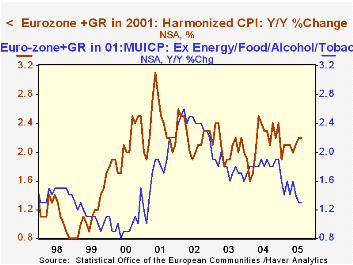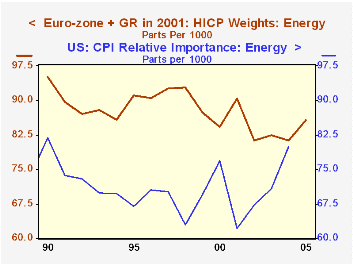 Global| Sep 16 2005
Global| Sep 16 2005Euro-Zone Harmonized CPI Inflation Only Slightly Higher in August; "Core" Remains Steady
Summary
The Euro-Zone CPI inflation picked up marginally in August, reaching 2.24% after July's 2.16% year-on-year pace. Notably, however, these are both lower than the 2004 rate of 2.36%. Eurostat reported these data this morning at 5:00AM [...]

The Euro-Zone CPI inflation picked up marginally in August, reaching 2.24% after July's 2.16% year-on-year pace. Notably, however, these are both lower than the 2004 rate of 2.36%.
Eurostat reported these data this morning at 5:00AM New York time. Haver's "European shift" posted the headline percentage changes at 5:04 and the full set of files, including harmonized CPIs for all the constituent countries, at 5:13AM. The European shift gets into full swing at about 1:30AM and overlaps a few hours with regular daytime operations. Thus, all the major European releases are updated in "real time" for European users.
In the table below, we highlight a few of the major CPI components. The "core" excluding energy food, alcohol and tobacco was steady at a 1.32% 12-month pace. Interestingly, the slight increase in overall inflation was not due to faster energy price increases. At 11.6% over a year ago, energy prices went up plenty fast, but this was actually a bit less than in July. Food, alcohol and tobacco increased to 1.5% from 1.2% in July. At the same time, both the core and the food subset are slower than they were during 2004.
Several commodity and service groupings are running slower than they did in 2004: household equipment and supplies, clothing, education expenses and "miscellaneous" items. Among groups with stronger prices, housing expenses for utilities are accelerating, but inflation of rents and home repair costs is holding steady. Communications rates are declining, but less than they were last year. Transportation costs are mixed; vehicle prices have picked up, but only a little. Vehicle operations (including fuel) actually saw their major advance last year, and while inflation there is high, it has been no worse than during 2004. Transportation services have a very ragged pattern, which might be seen as evidence that the whole market for these fares is unsettled.
At the consumer price level in Europe, energy constitutes 8.6% of the total index. This is remarkably similar to the US, where the "relative importance" of energy in the CPI is almost exactly 8% -- or has been. These modest weights are likely to change, though, perhaps more than this year's move, which in Europe was 4.3 percentage points over 2004.
| MUICP*Year/Year % Changes | Aug 2005 | July 2005 | June 2005 | December/December|||
|---|---|---|---|---|---|---|
| 2004 | 2003 | 2002 | ||||
| Total | 2.24 | 2.16 | 2.07 | 2.36 | 1.96 | 2.28 |
| Ex Energy, Food, Alcohol & Tobacco | 1.32 | 1.32 | 1.32 | 1.86 | 1.62 | 2.21 |
| Energy | 11.63 | 11.80 | 9.42 | 6.99 | 1.78 | 3.69 |
| Food, Alcohol & Tobacco | 1.52 | 1.17 | 1.17 | 1.96 | 3.62 | 2.07 |
| Household Supplies, Equipment & Maintenance | 0.54 | 0.64 | 0.82 | 0.82 | 1.11 | 1.40 |
| Clothing & Footwear | -0.77 | -0.48 | 0.27 | 0.63 | 1.00 | 1.77 |
| Recreation & Culture | -0.09 | -0.19 | -0.29 | -0.09 | -0.19 | 0.56 |
| Hotels & Restaurants | 2.51 | 2.60 | 2.46 | 2.66 | 2.82 | 4.51 |
Carol Stone, CBE
AuthorMore in Author Profile »Carol Stone, CBE came to Haver Analytics in 2003 following more than 35 years as a financial market economist at major Wall Street financial institutions, most especially Merrill Lynch and Nomura Securities. She had broad experience in analysis and forecasting of flow-of-funds accounts, the federal budget and Federal Reserve operations. At Nomura Securities, among other duties, she developed various indicator forecasting tools and edited a daily global publication produced in London and New York for readers in Tokyo. At Haver Analytics, Carol was a member of the Research Department, aiding database managers with research and documentation efforts, as well as posting commentary on select economic reports. In addition, she conducted Ways-of-the-World, a blog on economic issues for an Episcopal-Church-affiliated website, The Geranium Farm. During her career, Carol served as an officer of the Money Marketeers and the Downtown Economists Club. She had a PhD from NYU's Stern School of Business. She lived in Brooklyn, New York, and had a weekend home on Long Island.
More Economy in Brief
 Global| Feb 05 2026
Global| Feb 05 2026Charts of the Week: Balanced Policy, Resilient Data and AI Narratives
by:Andrew Cates





